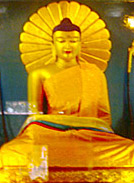 The numerous Buddhist festivals and ceremonies mirror the importance of the religion. Every festival in Buddhism is marked by an important event either in the life of the Buddha as well as the bodhisattvas. While some of these have their origin in the Theravada sect the other festivals and ceremonies are closely associated with Mahayana School.
The numerous Buddhist festivals and ceremonies mirror the importance of the religion. Every festival in Buddhism is marked by an important event either in the life of the Buddha as well as the bodhisattvas. While some of these have their origin in the Theravada sect the other festivals and ceremonies are closely associated with Mahayana School.Buddhist New Year: For consecutive three days the Buddhist New Year is celebrated in the Buddhist countries that adhere to the Theravada school. Thailand, Burma, Sri Lanka, Cambodia and Laos celebrate the New Year with a lot enthusiasm. It is celebrated in the first full moon day in April.
Loy Krathong : It is also known as the Festival of Floating Bowls. It is observed on the full moon night of the 12th Lunar month. Traditionally it was celebrated to pay homage to the footprints of the Buddha. People used to travel to the Narmada River in India. Today, however, it signifies the eradication of omen. The Buddhist followers carry flowers in bowls made of leaves, incense sticks and candles. They then float these bowls in the river. As the bowl disappears with the waves it is said to take away all the bad luck.
The Ploughing Festival: It is mainly held to ensure good yield of crops. The white oxen that pull the plough are offered rice, beans, maize, hay and water. This festival marks Buddha's attainment of the first level of Jhana just at the age of seven. That day too an annual ploughing festival was being held in King Suddhodana's kingdom. Till date the tradition continues with the Buddhist followers.
The Festival of the Tooth : One of the relics of Buddha, his tooth is kept, is a small hill of Sri Lanka. Here a temple has been built. Though the relic is not for public view but every year a procession is organized on the full moon night in August.
Ulambana : It is also known as the Ancestor Day. In the Mahayana tradition it is believed that the gates of hell are opened on the first day of the 8th lunar month. The ghosts are free to visit the human abode for the next 15 days. To relieve from their pain and sufferings food is offered to these spirits. The 15th day is celebrated as Ulambana. On this the people visit the cemetery, make offerings and pry for the departed souls.
Avalokiteshvara's Birthday : Avalokitesvara is one of the most well known bodhisattvas in Buddhism. As a result his birthday is celebrated with a lot of fervor. This festival is celebrated on the full moon day in March.
Pavarana Day: The celebrations of the Asalha Puja Day come to an end on this day. This is the interaction day for the monks in the monasteries. They point out each other's vices as well as virtues. The origin for celebrating this day is steeped in legends. When the monks took shelter from the rain they avoided talking to each other to avoid conflict. Buddha, however, disapproved of such a silence and ordered the monks to interact amongst themselves. From that day this festival is still celebrated.
Kathina Ceremony or Robe Offering Ceremony: This festival too is celebrated during the rain retreat. On this day the common people offer new robes to the Buddhist monks.
Anapanasati Day : At the end of the three months retreat Buddha was so impressed by the monks that he requested them to stay back for another month. On the full moon day of the fourth month he delivered his doctrine on Anapanasati or the mindfulness of breathing.
For more, visit the link below: